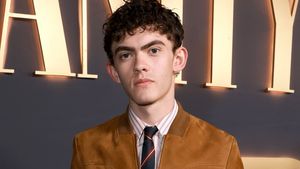Other than the protagonist being gay, the Intervention episode with alcoholic Christopher Brady that aired last summer didn't stray too far from the usual blueprint of the show, which chronicles people suffering with extreme substance abuse. The drunken rages of Brady and the toll they took on his partner, Shawn Hanshew-Brady, were typically heartbreaking, but the episode ended on a positive note with Chris entering rehab and embracing sobriety. The show's final notes indicated Chris had been sober since October 2008 and the couple was planning a commitment ceremony. But Chris relapsed, and on August 28, 2009, he ended his own life. In advance of A&E reairing Chris's episode Monday at 9 p.m. Eastern, Hanshew-Brady spoke to The Advocate about his experience on Intervention as well as being denied hospital visitation rights as Chris lay dying.
The Advocate: Do you regret taking part in Intervention?
Shawn Hanshew-Brady: I don't. A lot of people ask me that, especially now. But when we originally shot the episode, Chris was very, very sick. His alcoholism had progressed, he had developed a lot of health problems, and really the show prolonged his life. I have no doubt that something tragic would have happened at that time, even before we had agreed to do the documentary. It did give him the opportunity to have some peace when we sent him to rehab. He did extremely well [there], so I don't regret it at all.
Did you have some good time together before his last relapse?
We did, we did. But it was off and on; his addiction was very, very powerful, unfortunately. Actually, at the end of his rehab [in Malibu, Calif.], when we were taping for Intervention, they did fly me out there and we did a surprise reunion. We got to spend three days together and we went to Santa Monica, we went to L.A., we did a lot of really nice things that are beautiful memories, so I'm really thankful for that. But even after he got home to Delaware, it was touch and go. We would have a great day, and then he would relapse and it was a vicious cycle that would always repeat.
How long were you together?
Fifteen years.
Was he struggling with addiction when you first met?
He was, but it wasn't really at the forefront. You know, he always told me that he felt that his addiction [existed] for two reasons. One was unfortunate genetics, and alcoholism did run in his family, but also the fear of coming out really contributed significantly to his addiction. When he was was younger, even before I came around, he just couldn't cope with "What's going to happen to me if my family and friends find out I'm gay?" so he would turn to the bottle. That's really how his addiction became so significant -- his fear over being a gay man. That's very sad to me because that's a huge problem in society, especially with teenagers. They're so afraid to come out, and the first instinct that they have is to turn to drugs or alcohol to cope. That just starts the cycle.
Is the gay dependence on substances getting better as society grows more accepting?
Well, equality was very important to Chris. We were very upset and bothered by the fact that we couldn't get married -- that was a really big deal to Chris. And actually, that part made it to the show, you know, the lack of gay marriage, the lack of gay rights. Why weren't we recognized as a committed couple like other people? That caused great pain to him. These stories like mine and Chris's need to get out there and show people that [gay inequality causes] real pain. In fact, one of the things I'm going public with is that when I found Chris he was still somewhat alive -- barely alive, but alive. I was denied entrance into the E.R. while my partner of 15 years was lying dying. They made me wait in a children's nursery while my partner was dying in the E.R. It happens all the time. I can't tell you the pain knowing that Chris wasn't going to make it and then to add onto it and make me feel like a second-class citizen. So many things need to change.
Are there civil unions or domestic partnerships in Delaware?
No. Not yet.
Were Chris's fears unfounded or legitimate, as far as his family turning against him for being gay?
A little of both. It was just lack of ever being around a situation like that. For many years, we were never included as a couple until Chris finally stood up to his family and said, "Look, it's either going to be me and Shawn or not me at all." And once his family realized that they caused him pain, they really did come around. It was never the way we originally wanted it, but at least we were recognized. I think that families really need to be more educated in terms of accepting gay children and their partners. That's something that we struggled with, but in the end I can honestly say that Chris's immediate family and I did shoulder up together, and we worked on our relationship and how we were going to help Chris together as a family. Even now, his immediate family and I are extremely close. We have the kind of relationship now that Chris always wanted us to have. It's just sad that it had to happen after he passed away.
Have you ever struggled with addiction yourself?
I haven't, and honestly I was pretty sheltered growing up. I was never really exposed to any form of addiction at all, so it was a learning process to me. Even going through all of those years, at first I really didn't know what to do, because I had never been around that, but when Chris's addiction became really bad I really started educating myself on codependency. A lot of people have asked me why I stayed all those years. I even still get that question now but I always told myself, What would I want Chris to do with me? He wouldn't have deserted me, he would have moved mountains. I never gave up because he was my partner; I loved him, he was half of my life.
When he was in the throes of addiction, what kind of drinker was he?
Most of the time he was violent, and I would have to sometimes leave our home and stay with my cousin because things would get so bad. And other times he would binge and just hole up in our bedroom for three or four days.
Was it hard for him to keep a job?
For the last few years it was really difficult, and that was really sad for me because he was an extremely talented florist. He did wedding planning, he was very artistic, and the last three years of his life he was drinking every day, and he just couldn't keep a job. Obviously, it was financially difficult because I had to keep the household running.
When he fell off the wagon before the show, was there a traumatic event that flipped the switch in his head, or was it the accumulation of issues?
It was an accumulation of things. The disease of addiction, his alcoholism, it really is a medical condition, and that's something I have never truly realized because when people think of addiction they think, Oh, this person is weak, they should be able to stop. It's really not that; it's a medical condition, a documented disease. It's just like cancer, a tumor that never goes into remission.
Will you be watching the episode?
I'm back and forth with it. I'm very lucky because I have a huge support system and I've had a few friends who say they'd come over and watch it with me. But I just don't know at this point. It's still very hard for me; it's only been seven months since he's been gone. It's still raw. To have Chris's story aired nationally again, and updating it with his death, I keep telling myself that if I can just save one life that night, then it'll be worth it. That's what I keep telling myself.



















































































